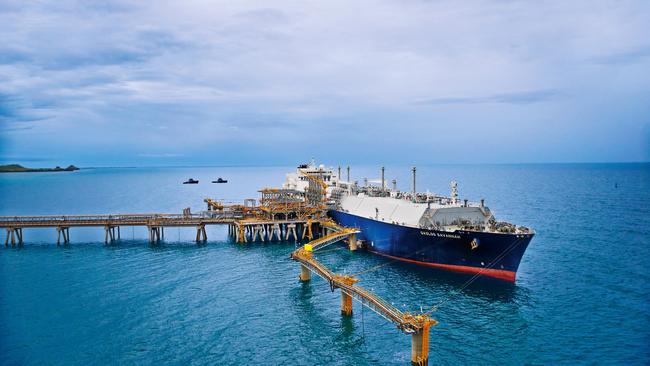Australia to blame for energy crisis: Santos CEO Kevin Gallagher
Policy failure and climate wars are to blame for the national energy crisis rather than Russia’s invasion of Ukraine, Santos boss Kevin Gallagher says.
Business
Don't miss out on the headlines from Business. Followed categories will be added to My News.
Australia’s policy failure and climate wars are to blame for a national energy crisis rather than Russia’s invasion of Ukraine, Santos chief executive Kevin Gallagher said, adding households were worried about resource nationalism and price inflation.
“There are conversations of fear that I never expected to see in my lifetime and in Australia they are the consequence of more than a decade of energy policy failure that quite frankly I’ve been warning about for many years,” he told an investor day on Tuesday.
“They’re also the consequence of domestic climate wars much more than they are a consequence of Russia’s invasion of Ukraine … Climate wars have left us without a carbon price or the right market signals for energy and decarbonisation investments. The high oil and gas prices that we’re seeing today were emerging before the war.”
Santos is among three LNG exporters which may be hit with intervention by the federal government as it seeks to cut domestic prices for manufacturers.
The Santos boss also warned of a dangerous “tipping point” as producers hold off committing investment developing oil and gas supplies, adding to security of supply risks. “Energy policy globally and in Australia is at a very dangerous tipping point. Producers in the western world have slowed or stopped investing in new oil and gas, but customers have not stopped buying or consuming these products because they can’t,” Mr Gallagher said.
“The low emissions technologies and clean energy infrastructure required to deliver them is simply not yet available. And government policies that seek to disrupt the energy system so as to hasten the transition to a low carbon future are having exactly the opposite effect.”
Santos has also split its business in two – with a new energy solutions arm in addition to its mainstay oil and gas business – as it seeks to reposition the company to meet emissions goals while flagging a drop in production.
Credit Suisse analyst Saul Kavonic said the business split could lead to an official spin-off of the low carbon energy solution business down the track.
“The potential to build a low carbon division that could be partially or fully spun off at a higher multiple in the future could add value. But it’s likely to be a multi year journey through ample policy, technology and market risks to get there,” he said.
The company will be divided between an upstream gas and liquids business and an energy solutions unit as part of its new mantra concentrating on backfilling and sustaining oil and gas supplies, boosting decarbonisation and building a bigger clean fuels division.

While Santos has maintained 2022 guidance at 103-106 million barrels of oil equivalent, it flagged a steep drop the following year to a 91-98 million boe range as its Bayu-Undan field winds down along with the expected sale of a stake in PNG LNG and lower West Australian production.
The upstream business will include three LNG projects – PNG LNG, Gladstone LNG and Darwin LNG – along with Santos domestic exploration and production with earnings of $US2.6bn in the first half of 2022.
The energy solutions division includes low carbon processing of Santos’ and third-party gas and liquids through projects such as its Moomba carbon capture plant, decarbonisation and carbon management services and clean fuel production. It represented earnings of $149m in the first half.
The new focus replaces the transform, build, grow focus introduced by Mr Gallagher after he was appointed in 2016 to the top job at the Adelaide producer and comes amid increasing scrutiny of the medium term role of fossil fuels in the economy.
“Given the strong customer demand for our product now and into the future, we will seek to backfill and sustain our core assets to deliver the critical fuels the world needs into the 2040s,” Mr Gallagher said. “But we will also decarbonise these critical fuels, in-line with our target of net-zero emissions (scope 1 and 2, equity share) by 2040, and produce clean fuels as customer demand evolves. This will provide a low carbon intensity base business that will provide a strong foundation to provide sustainable shareholder returns and fund the energy transition.”
Major projects capital expenditure in 2022 is expected to be approximately $US1.2bn, the midpoint of the previous guidance range, while 2022 unit production costs are expected to be at the lower end of the $US7.90-8.30/boe guidance range. For 2023, major projects capital expenditure is forecast at $US1.835 billion which includes the Barossa, Pikka Phase 1, Papua and Moomba CCS projects.
Originally published as Australia to blame for energy crisis: Santos CEO Kevin Gallagher



